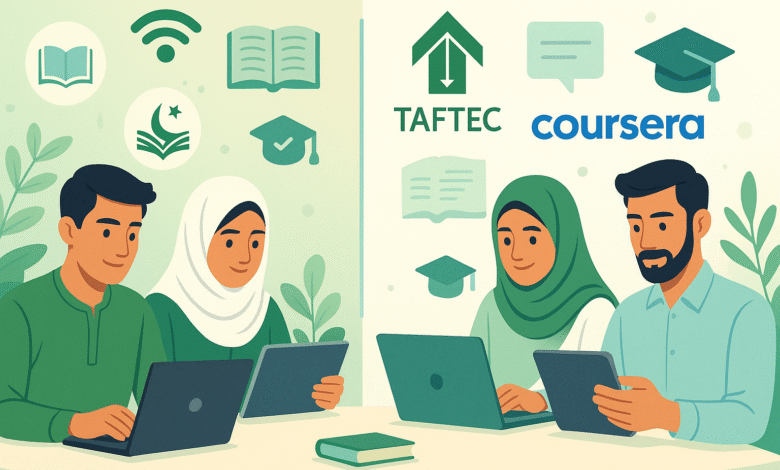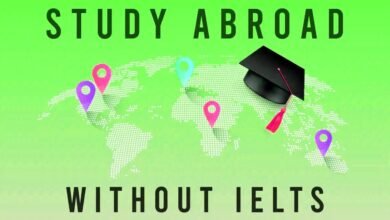Online Education in Pakistan: Comparing Local and International Platforms

The digital revolution has transformed how students across Pakistan access quality education. Online education in Pakistan has grown from a niche concept to a mainstream learning solution, especially after the global shift toward remote learning. With millions of students seeking flexible and affordable educational opportunities, both local and international e-learning platforms are competing to serve this growing market.
Pakistan’s education sector faces unique challenges, including limited access to quality institutions, geographic barriers, and economic constraints. Digital learning platforms have emerged as a promising solution, offering students from Karachi to Lahore, and from Islamabad to smaller cities, the chance to pursue their educational goals without traditional limitations.
The Current State of Online Education in Pakistan
Online education in Pakistan has experienced remarkable growth over the past five years. According to recent studies, the e-learning market in Pakistan is expected to reach significant milestones, driven by increasing internet penetration and smartphone adoption across the country.
The COVID-19 pandemic accelerated this transformation, forcing educational institutions to adopt virtual learning methods almost overnight. This sudden shift revealed both the potential and challenges of digital education in Pakistan. While urban areas adapted relatively quickly, rural regions faced connectivity and infrastructure issues that highlighted the digital divide.
Today, Pakistani students can choose from various online learning options, ranging from short skill-based courses to complete degree programs. The flexibility of distance learning in Pakistan appeals particularly to working professionals, women who face mobility restrictions, and students in remote areas where quality educational institutions are scarce.
Key Statistics and Trends
The growth trajectory of online learning platforms in Pakistan shows promising numbers. Internet users in Pakistan have surpassed 100 million, with mobile internet leading the charge. This connectivity boom has created a fertile ground for e-learning initiatives.
Student enrollment in online courses has increased by over 300% in recent years, with technology, business, and language courses being the most popular choices. The trend indicates a shift toward practical, skill-oriented education that directly impacts career prospects.
Local Pakistani Online Learning Platforms
VU-LMS (Virtual University Learning Management System)
Virtual University of Pakistan pioneered online education in Pakistan and remains one of the most established players in the market. Their Learning Management System serves thousands of students across the country, offering degree programs from bachelor’s to PhD levels.
The platform’s strength lies in its local context and understanding of Pakistani educational needs. Courses are designed keeping in mind the local job market, cultural considerations, and language preferences. The university offers programs in both English and Urdu, making education accessible to a broader audience.
Students appreciate the affordability of VU programs compared to traditional universities. The fee structure is significantly lower than conventional institutions, making higher education accessible to students from diverse economic backgrounds.
SABAQ Foundation
SABAQ has made significant contributions to online learning Pakistan by providing free educational content aligned with the national curriculum. Their platform focuses primarily on K-12 education, offering video lessons, practice exercises, and assessment tools.
The foundation’s approach to localized content creation has set a benchmark for educational technology in Pakistan. Their videos are created by local teachers who understand the specific challenges students face with the Pakistani curriculum.
Taleemabad
This platform has gained popularity for its interactive approach to digital education Pakistan. Taleemabad combines entertainment with education, creating engaging content for students from primary to secondary levels.
Their gamified learning approach resonates well with younger students, and the platform has successfully created a community of learners who actively participate in educational activities and competitions.
Rozee.pk Learning
While primarily known as a job portal, Rozee.pk has expanded into online education by offering professional development courses. Their focus on skill development Pakistan addresses the gap between academic education and industry requirements.
The platform’s career-oriented courses are particularly valuable for fresh graduates and professionals looking to enhance their skills. The direct connection to job opportunities makes this platform unique in the Pakistani e-learning landscape.
International Platforms Serving Pakistani Students
Coursera
Coursera has established itself as a leading international platform for online courses Pakistan students prefer. The platform offers courses from top universities worldwide, providing Pakistani students access to world-class education.
The platform’s financial aid program has been particularly beneficial for Pakistani students who cannot afford full course fees. Many students have successfully completed specialized programs that have significantly enhanced their career prospects.
Coursera’s partnership with local institutions and governments has helped create more targeted offerings for the Pakistani market. The platform regularly features courses relevant to the local job market and economic conditions.
edX
MIT and Harvard’s joint venture, edX, has attracted thousands of Pakistani students seeking high-quality online education. The platform’s focus on academic rigor and university-level courses appeals to students looking for credible certifications.
The availability of free audit options has made edX particularly popular among Pakistani students who want to learn from prestigious institutions without financial burden. Many students use these courses to prepare for higher studies abroad or to enhance their knowledge in specific fields.
Udemy
Udemy’s marketplace model has created opportunities for both Pakistani instructors and students. The platform hosts numerous courses created by Pakistani professionals, contributing to the local e-learning ecosystem.
The practical, skill-focused approach of Udemy courses aligns well with the needs of Pakistani students who prefer learning applicable skills over theoretical knowledge. The platform’s frequent discounts and promotions make it accessible to price-sensitive Pakistani market.
Khan Academy
Khan Academy’s free educational content has been instrumental in supporting online learning in Pakistan, especially during the pandemic. The platform’s mathematics and science content is widely used by students preparing for competitive exams.
The availability of content in Urdu and the platform’s mobile-friendly design have contributed to its popularity in Pakistan. Teachers across the country use Khan Academy resources to supplement their classroom instruction.
Advantages of Local Platforms
Cultural and Linguistic Relevance
Local platforms understand the cultural context of Pakistani students better than international alternatives. Content is often available in Urdu and other regional languages, making learning more accessible to students who are not comfortable with English-only instruction.
The examples, case studies, and practical applications used in local platforms relate directly to the Pakistani context, making learning more relevant and applicable to students’ daily lives and career goals.
Affordable Pricing Structure
Online education in Pakistan through local platforms is generally more affordable than international alternatives. Local platforms understand the economic constraints of Pakistani students and structure their pricing accordingly.
Payment methods are also more convenient, with options for local bank transfers, mobile wallets, and even installment plans that accommodate the financial realities of Pakistani families.
Local Industry Connections
Pakistani platforms often have better connections with local industries and employers. This translates into more relevant course content, better internship opportunities, and higher chances of job placement after course completion.
Career services and job placement assistance are typically more effective when provided by local platforms that understand the Pakistani job market dynamics.
Government Recognition and Accreditation
Courses and degrees from recognized local platforms often have better acceptance in Pakistani institutions and government jobs. The Higher Education Commission of Pakistan’s recognition carries significant weight in the local job market.
Advantages of International Platforms
Global Recognition and Credibility
Certificates and courses from international platforms like Coursera and edX carry global recognition, which is particularly valuable for students planning to work abroad or with international companies.
The prestige associated with courses from renowned universities like Stanford, MIT, or Harvard can significantly enhance a student’s profile in competitive job markets.
Cutting-Edge Content and Technology
International platforms often feature the latest technological advancements and pedagogical approaches. Students get exposure to global best practices and emerging trends in their fields of study.
The production quality of courses on international platforms is typically higher, with professional video production, interactive elements, and comprehensive assessment tools.
Diverse Perspectives and Global Network
Online learning through international platforms exposes Pakistani students to diverse perspectives and global viewpoints. This cultural exchange enhances critical thinking and prepares students for globalized work environments.
The opportunity to interact with students from different countries and backgrounds creates valuable networking opportunities that can benefit career development.
Advanced Learning Analytics
International platforms typically offer more sophisticated learning analytics and personalized learning experiences. AI-powered recommendations and adaptive learning paths can significantly improve learning outcomes.
Challenges Faced by Pakistani Students
Internet Connectivity and Infrastructure
Despite growing internet penetration, connectivity remains a significant challenge for online education in Pakistan. Students in rural areas often struggle with slow internet speeds and frequent disconnections that disrupt their learning experience.
The cost of high-speed internet is still prohibitive for many families, creating a barrier to consistent online learning. Power outages, common in many parts of Pakistan, further complicate the online learning experience.
Digital Literacy Gap
Many Pakistani students, especially those from traditional educational backgrounds, lack the digital skills necessary to navigate online learning platforms effectively. This digital literacy gap can significantly impact learning outcomes.
The transition from traditional classroom learning to digital education requires adaptation to new tools, interfaces, and learning methodologies that can be overwhelming for some students.
Language Barriers
While English proficiency is growing in Pakistan, it remains a significant barrier for many students accessing international online platforms. Complex academic English used in many courses can be challenging for students whose first language is Urdu or other regional languages.
Economic Constraints
The cost of devices, internet connectivity, and course fees can be prohibitive for many Pakistani students. Even when courses are free, the associated costs of reliable internet and appropriate devices create barriers to access.
Lack of Practical Components
Many technical and professional courses require hands-on practice that can be challenging to deliver through online learning platforms. Pakistani students often struggle with the lack of laboratory access, internship opportunities, and practical training components.
Future Prospects and Recommendations
Government Initiatives and Support
The Pakistani government has recognized the importance of digital learning and has initiated several programs to support online education. The Digital Pakistan initiative aims to improve internet infrastructure and digital literacy across the country.
Educational policies are being updated to accommodate and recognize online learning, which will help legitimize and expand the e-learning market in Pakistan.
Hybrid Learning Models
The future of online education in Pakistan likely lies in hybrid models that combine the best of online and offline learning. This approach can address some of the limitations of purely online education while maintaining its flexibility and accessibility.
Technology Infrastructure Improvements
Continued investment in internet infrastructure and the rollout of 5G technology will significantly improve the online learning experience for Pakistani students. Better connectivity will enable more interactive and media-rich educational content.
Localized Content Development
There’s a growing need for more localized educational content that addresses the specific needs of Pakistani students and the local job market. Collaboration between international platforms and local educators can create content that combines global standards with local relevance.
Conclusion
Online education in Pakistan has evolved from a supplementary learning option to a mainstream educational pathway. Both local and international platforms offer unique advantages and face distinct challenges in serving Pakistani students.
Local platforms excel in cultural relevance, affordability, and local industry connections, while international platforms offer global recognition, cutting-edge content, and diverse perspectives. The choice between these options depends on individual student needs, career goals, and circumstances.
The future of online learning in Pakistan looks promising, with improvements in technology infrastructure, government support, and growing acceptance of digital credentials. However, addressing challenges like the digital divide, connectivity issues, and economic barriers remains crucial for realizing the full potential of online education.
For Pakistani students considering online education, the recommendation is to evaluate both local and international options based on their specific needs, career aspirations, and available resources. The combination of both local and international platforms can provide a well-rounded educational experience that prepares students for success in both local and global contexts.
As digital education continues to evolve, Pakistani students have unprecedented access to quality education that was once limited by geographic and economic constraints. The key to success lies in choosing the right platform, staying motivated, and actively engaging with the learning community to maximize the benefits of online education.











